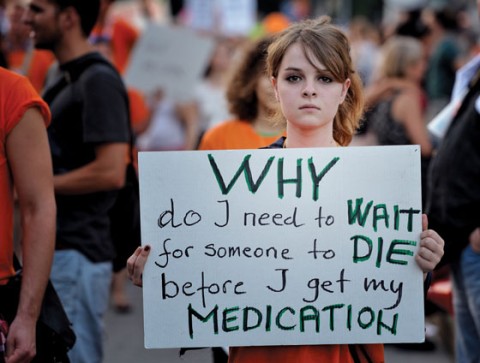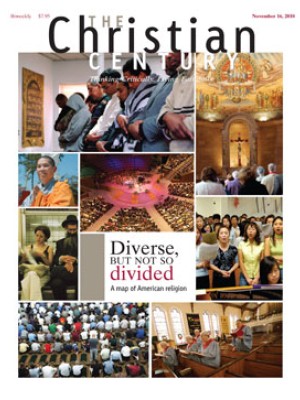Losing ground: Less money for AIDS work

When members of faith-based groups get together these days, one concern is woven through every discussion: the flatlining or decline in funding for global AIDS work. According to Father Robert Vitillo, an adviser on HIV and AIDS to Caritas Internationalis, this funding crisis is already affecting the church's work.
"I was in Uganda in June. Our care workers there are being told that no new patients should be put on the rolls, and in some cases people are being dropped. Some newly diagnosed families are being told that they have to choose which person will get treatment. Given the culture of Africa, that means the family will divide up the medication to share it among several members. As a result, no one will get well," Vitillo said.
Read our latest issue or browse back issues.
In October, the fears of faith-based groups were realized when donors from 40 countries met to make pledges to the Global Fund to Fight AIDS, Tuberculosis and Malaria. They raised only $11.7 billion over three years, far short of a hoped-for $20 billion, let alone the $13 billion needed to maintain treatment at its current rates. (The U.S. increased its pledge 40 percent, to $4 billion.) The new pledges mean the Global Fund will have only $4 billion per year through 2012, a dramatic drop from 2009, when donor governments provided $7.6 billion in one year for AIDS programs.
Several financial big shots, like Microsoft cofounder Bill Gates, were among the 20,000 people attending the International AIDS Conference, held in Vienna last July. Gates and others urged support for Treatment 2.0, the idea that greater efficiency in AIDS work will allow agencies to do more with less.
Michele Broemmelsiek, who directs AIDS work for Catholic Relief Services, said most faith-based groups will have a hard time with Treatment 2.0. "At a certain point, you can't do any more with less, you've reached every efficiency, you've maximized everyone's time, you've figured out how to make patient flow work like a dream, there isn't more efficiency to add to the system, and yet you've got to add more people to treatment," she said.
Ann Smith, HIV corporate strategist for the Catholic Agency for Overseas Development, an agency of the Catholic community of England and Wales, claimed that in an era of declining budgets, faith-based organizations are the last that should be cut.
"Research on antiretroviral treatment in Asia and Africa shows that faith-based organizations have a higher level of compliance, because the service they provide is more than just the medical component. It's all about support, home visits and helping people reintegrate socially and economically. So adherence is much higher," she said.
The cruel irony of funding cuts is that current programs are working, and antiretroviral drugs are keeping people healthier.
"The staff members of these programs are today working with hope rather than despair. Rather than dying, people are asking them how to get a job or get back into school or learn farming skills. There's a decrease in the number of orphans. All of that is going to change for the worse with the withdrawal of funding. It's an injustice that our churches should be shouting about very loudly," Smith said.
"We're really at a tipping point in the struggle against HIV and AIDS," said Donald Messer, executive director of the Colorado-based Center for the Church and Global AIDS. "Once the flavor of the month for funders, it seems to be going out of favor. We're challenged today by AIDS funding fatigue. Some people are more interested in easier diseases to treat and less controversial ones, like malaria. Some of the crisis is due to the global economic crisis, but it's also clear that governments are not cutting back on military expenditures."
The visibility of faith-based groups in the global discussion of HIV and AIDS has been steadily rising in recent years, in part because of the key role they play in caring for people living with the virus. In some parts of sub-Saharan Africa, for example, faith-based organizations provide up to 70 percent of health care. Yet some in the AIDS community remain reluctant to listen to voices from the faith community, turned off by the Vatican's opposition to condoms or the role of some northern mission groups in pushing the criminalization of homosexual behavior in several African countries.
J. P. Mokgethi-Heath, an Anglican priest in South Africa, said he felt welcome at the Vienna meeting. "The voices of faith-based people were integrated into the conference more than ever before. A bigger variety of people came to listen to us, and remarkably they didn't walk out on us. But this also meant that we've had to listen to what other people are saying," he said.
Mokgethi-Heath, who is HIV-positive, says obstacles to broader collaboration still exist. "We can't really expect people to partner with us if we continue to work from judgment. We just can't get away from the mind-set that says if we can somehow judge it, then we can fix it. Once we've labeled it as sin, then it's fine."
The emphasis that faith groups place on behavior change as a key component of preventing AIDS was nonetheless vindicated in a study released by UNAIDS in July. It showed that HIV prevalence among young people has declined by more than 25 percent in 15 of the 21 countries most affected by AIDS. In eight countries, declines in HIV prevalence have resulted, at least in part, from changes in sexual behavior among young people. They are waiting longer before becoming sexually active and having fewer partners.
Yet the demographics of HIV and AIDS are changing, and the migration of the disease into new populations poses particular challenges to the church, according to a U.S. priest who runs a massive AIDS program in Namibia.
"Many of the new HIV infections are found among the most marginalized people," said Father Richard Bauer, executive director of Catholic AIDS Action. "Our response to the gospel today isn't to reach out to the tax collector and leper, but rather to the intravenous drug user in Ukraine or the woman in commercial sex work who's being trafficked. They are calling the church to be no longer comfortable only in parish settings. We've got to go to the margins as Jesus did."






